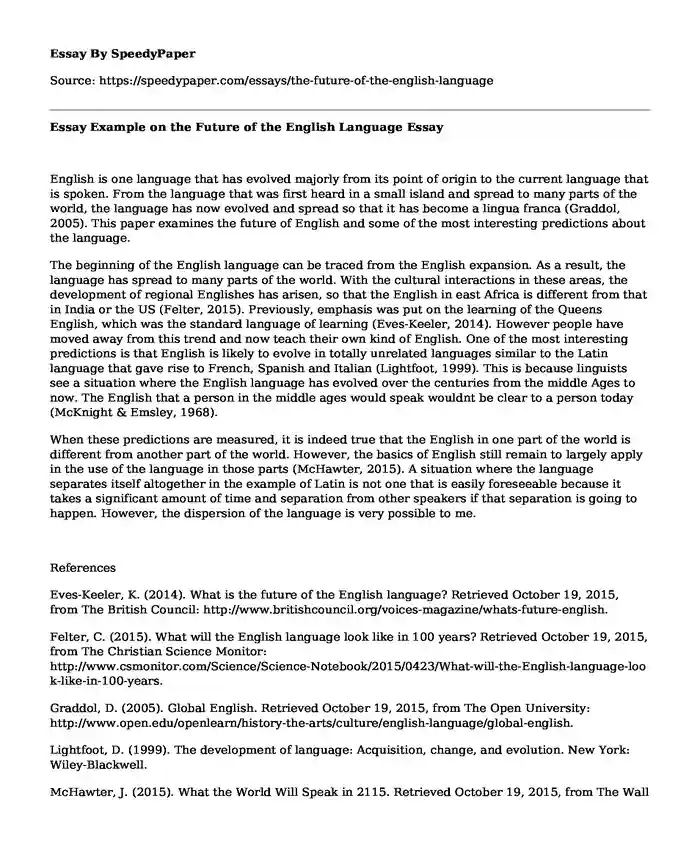
| Type of paper: | Essay |
| Categories: | English 101 Linguistics |
| Pages: | 2 |
| Wordcount: | 458 words |
English is one language that has evolved majorly from its point of origin to the current language that is spoken. From the language that was first heard in a small island and spread to many parts of the world, the language has now evolved and spread so that it has become a lingua franca (Graddol, 2005). This paper examines the future of English and some of the most interesting predictions about the language.
The beginning of the English language can be traced from the English expansion. As a result, the language has spread to many parts of the world. With the cultural interactions in these areas, the development of regional Englishes has arisen, so that the English in east Africa is different from that in India or the US (Felter, 2015). Previously, emphasis was put on the learning of the Queens English, which was the standard language of learning (Eves-Keeler, 2014). However people have moved away from this trend and now teach their own kind of English. One of the most interesting predictions is that English is likely to evolve in totally unrelated languages similar to the Latin language that gave rise to French, Spanish and Italian (Lightfoot, 1999). This is because linguists see a situation where the English language has evolved over the centuries from the middle Ages to now. The English that a person in the middle ages would speak wouldnt be clear to a person today (McKnight & Emsley, 1968).
When these predictions are measured, it is indeed true that the English in one part of the world is different from another part of the world. However, the basics of English still remain to largely apply in the use of the language in those parts (McHawter, 2015). A situation where the language separates itself altogether in the example of Latin is not one that is easily foreseeable because it takes a significant amount of time and separation from other speakers if that separation is going to happen. However, the dispersion of the language is very possible to me.
References
Eves-Keeler, K. (2014). What is the future of the English language? Retrieved October 19, 2015, from The British Council: http://www.britishcouncil.org/voices-magazine/whats-future-english.
Felter, C. (2015). What will the English language look like in 100 years? Retrieved October 19, 2015, from The Christian Science Monitor: http://www.csmonitor.com/Science/Science-Notebook/2015/0423/What-will-the-English-language-look-like-in-100-years.
Graddol, D. (2005). Global English. Retrieved October 19, 2015, from The Open University: http://www.open.edu/openlearn/history-the-arts/culture/english-language/global-english.
Lightfoot, D. (1999). The development of language: Acquisition, change, and evolution. New York: Wiley-Blackwell.
McHawter, J. (2015). What the World Will Speak in 2115. Retrieved October 19, 2015, from The Wall Street Journal: http://www.wsj.com/articles/what-the-world-will-speak-in-2115-1420234648.
McKnight, G., & Emsley, B. (1968). The evolution of the English language: from Chaucer to the twentieth century. London: Dover.
Cite this page
Essay Example on the Future of the English Language. (2019, May 31). Retrieved from https://speedypaper.net/essays/the-future-of-the-english-language
Request Removal
If you are the original author of this essay and no longer wish to have it published on the SpeedyPaper website, please click below to request its removal:
- Free Essay with Public Address System Research
- Free Essay on the Impact of Divorce on Children and Adolescents
- Free Essay with Rhetorical Analysis of the Article Dedicated to Game Violence
- Essay Example on Leadership and Leadership Development
- Arts Critique Essay Example
- Free Essay: Public Health Leadership and a Definition of Systems Thinking
- Essay Sample on Starbucks' Human Resource Management Practices
Popular categories




